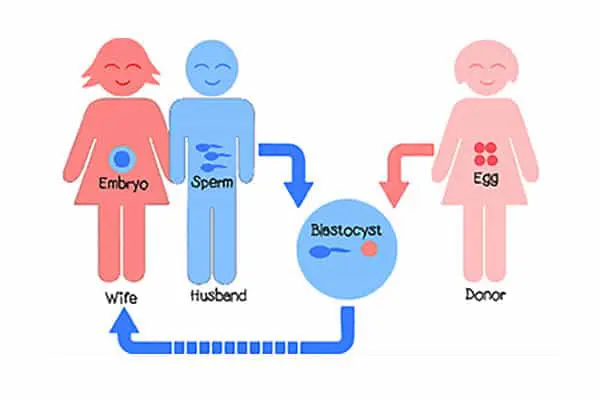In recent years, IVF has gained popularity amongst couples struggling with infertility. While being an effective fertility treatment, the procedure also takes a toll on finance and emotions. Addressing these factors, IVF centres in Jaipur and worldwide have introduced alternative medicines and therapies to reduce the load of IVF treatment and make it a happier journey to parenthood for the aspiring couples.
These alternative therapies not only alleviate the stress (which might reduce the treatment’s success rate as stress and infertility are co-related) but also helps improve the success rates of IVF, because “The happier and healthier your body and mind are, the more effectively medical treatments will work.”

Acupuncture, yoga, meditation, and other approaches are complementary or alternative therapies that might aid with complete holistic health and help with increased success rates. You’re on the right page if you’re undergoing IVF treatment or planning for it.
This blog will discuss alternative medicine and complementary therapy options with IVF, providing an overview of the best treatment. Furthermore, if you’re searching for an ideal fertility centre in Jaipur, Aastha Fertility Care can help you with the desired benefits, advising on IVF Dos’ and Don’ts for the highest success rates.

Complementary Therapies For Fertility
Acupressure or Acupuncture
- A pregnant female’s pelvic or back pain may be relieved by acupuncture.
- Even though acupressure or acupuncture’s usefulness to induce labour is debatable, these techniques are also employed.
- This complementary therapy is typically safe if received through certified services or an acupuncturist.
Massage
- Women frequently use massage therapy to help with stress relief, sleep improvement, and adjusting to physical changes.
- No or limited massage is given in the abdominal area.
- During the first trimester, this therapy is avoided.
- Lying on the back is avoided during your pregnancy’s second half since the vein connecting the legs to the heart is pressurised through it.
Yoga And Meditation
- Yoga and meditation improve the woman’s overall reproductive system during pregnancy.
- It increases blood circulation to the pelvic region while strengthening and toning the muscles supporting the reproductive system and facilitating better circulation.
- It also assists in improving respiratory quality and capacity along with spinal alignment improvement.
- Yoga and meditation provide therapeutic and calming effects on the body and mind.
- These complementary therapies can affect a woman’s fertility significantly.
Osteopathy And Chiropractic
- Women who experience pelvic pain and low back discomfort during pregnancy may benefit from osteopathic and chiropractic treatment.
- Although the efficacy of such therapies is debatable, females are considered safe when receiving them.
Naturopathy
- The healing power of nature is the basis of naturopathy and promotes health through dietary changes.
- Besides, herbal remedies and physical activities are also promoted. However, naturopathic remedies’ use in expecting mothers haven’t been thoroughly studied.
Besides, many more complementary therapies are available, such as herbal medication, aromatherapy, etc., that must be initiated along with IVF treatment only after consulting your fertility specialist.
Role Of Complementary Therapies In IVF Treatment
- Complementary therapies for IVF treatment are varied and offer an individualised, holistic, and encouraging approach.
- “Add-ons” or “adjuvants” are frequently used to describe complementary therapies.
- These alternative or complementary therapies may be employed with conventional ART treatment regimens to increase conception success rates.
- They provide several advantages as an integrative health strategy component.
- People who opt for alternative therapies while undergoing IVF are emotionally strong, calm, and can effectively handle and remain positive during treatment.
However, it is crucial to learn that several complementary treatments have no or limited research evidence to back up the adverse effects, efficacy, and risks involved.
Fertility specialists usually suggest these procedures based on the medical condition of the person undertaking IVF.

Integrating Complementary Therapies In IVF Treatment In Jaipur
Women always experience stress and anxiety during IVF treatment. However, yoga, meditation, acupuncture, and other complementary therapies help pregnant women to overcome stress and depression and improve treatment results. Meditation and yoga boost general health, and acupuncture and other complementary therapies boost blood circulation and balance hormones.
But in addition to standard medical attention, it’s crucial to employ complementary therapies under a trained and experienced healthcare practitioner’s supervision. By integrating complementary treatments into IVF therapy, the patient can receive a comprehensive approach to reproductive care, achieving their family-building goals and improving their chances of becoming pregnant.
Conclusion
To treat a female’s body and mind, or both, complementary therapies are utilised in addition to medical therapy. Acupuncture, therapy for the mind and body, yoga and meditation, etc., are complementary therapies that improve the IVF treatment experience of women undertaking it.
People in Jaipur considering IVF procedures may benefit from combining complementary therapies into their fertility care. Pregnant women use complementary treatments to aid with vomiting, nausea, back discomfort, and other symptoms.
Also, these therapies may be used by a few women to gain confidence, prepare for labour, and raise the likelihood of a straightforward delivery.
Do you need complementary therapies? Then, reach Aastha Fertility for advice on complementary therapies, IVF treatment, and their safety, uses, and efficacy. However, essential medical procedures must not be replaced by complementary therapies.
Lucas Noah, armed with a Bachelor’s degree in Information & Technology, stands as a prominent figure in the realm of tech journalism. Currently holding the position of Senior Admin, Lucas contributes his expertise to two esteemed companies: OceanaExpress LLC and CreativeOutrank LLC. His... Read more
